What are the most searched for finance questions on Google? And, importantly, what are the answers to your money queries?
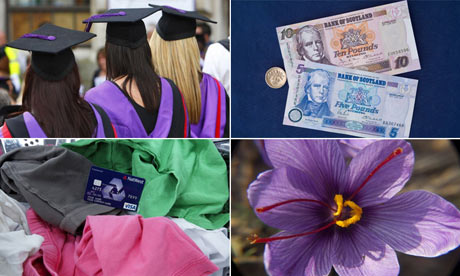
The questions we Google: should I pay my student loans; can I spend Scottish money in England; why is saffron so expensive; and will my credit cards work after going through the wash?
Start typing a query into Google – or whatever search engine you are using – and its autocomplete function will start suggesting popular questions from other users. So what do you want most answered? One of the top queries in the UK over the Olympics was "is Ian Thorpe gay".
The Australian swimmer was the star of the BBC Olympics commentary team in August. But he also prompted a "huge spike" in internet searches about his sexuality, says Google. Just type "is" into google.co.uk and it automatically tries to complete the sentence as "is Ian Thorpe gay".
The drop-down list in autocomplete is generated by the search engine's complex algorithms, based on other users' search activities and the contents of web pages indexed by Google.
The suggestions often seem strange or just plain silly. Google agrees. It explains: "There may be a search term that seems surprising to you, but after doing some searching on the web, you may discover that it's a popular phrase online for some reason that you didn't anticipate.
"Queries in autocomplete are algorithmically determined based on a number of factors (including search term popularity) without manual intervention."
The suggestions reflect regional activity, so Thorpe tops a search beginning "is" in the UK, but not in the US (where "is shingles contagious" is the top search result).
They also reflect recent activity – so Thorpe is likely to drop out of the list soon. "Is Kate Middleton pregnant" moved up from ninth to seventh most popular this week alone.
Pornography, violence, and hate speech are excluded from autocomplete, but Google has frequently found itself in court over the suggestions autocomplete makes. It lost a case in France last year involving the word "scam" appearing after a particular company's name. Meanwhile, in Japan it is battling a district court's order to suspend autocomplete altogether.
Here we reveal what you most want answered.
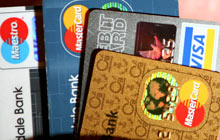 Worried about your credit rating? Your spouse's credit record? No, you're not. Start tapping into Google "will my credit..." and it reveals that the second most common dilemma is whether a credit card will survive a wash cycle. (The first, driven by users in the US, is "will my credit card work in Europe.") The trouble is, the answers that appear at the top of the search results can be as daft as the questions. For example, Yahoo! Answers tells you that a credit card that goes through a washing machine will carry on working so long as it's not damaged – but won't, if it is. True, but not especially helpful (and that was rated as "best answer" by Yahoo! readers).
Worried about your credit rating? Your spouse's credit record? No, you're not. Start tapping into Google "will my credit..." and it reveals that the second most common dilemma is whether a credit card will survive a wash cycle. (The first, driven by users in the US, is "will my credit card work in Europe.") The trouble is, the answers that appear at the top of the search results can be as daft as the questions. For example, Yahoo! Answers tells you that a credit card that goes through a washing machine will carry on working so long as it's not damaged – but won't, if it is. True, but not especially helpful (and that was rated as "best answer" by Yahoo! readers).
So we put it to Barclaycard, which operates more than 10m credit cards in the UK. It said: "Water won't damage the ability of a chip to function." The bigger problem will be if the plastic warps or even melts.
It seems credit card plastic can start to melt at around 57C, but that should make it safe in any British summer. Perhaps, though, you should be wary about flashing your plastic in Aziziya in Libya. It holds the record for the highest temperature measured, at 57.8C (136F). Mind you, that was in 1922.
As regards credit cards in Europe the Americans have a point; while our credit cards have a chip and the magnetic strip, most Americans are still using cards with a magnetic strips only, which might be rejected at some payment terminals over here. Tell them it's about European technological superiority.
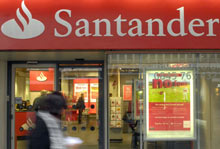 Before you've completed typing "is my money safe …" up pops "in Santander" as the suggested question. Evidently loads of you are worried that Spain's crisis-hit economy and bombed-out banking sector will affect your savings in Santander, Spain's second biggest bank and our fifth biggest. Indeed, nearly all of the "is my money safe" suggestions are about Spain, although you also ask about Barclays.
Before you've completed typing "is my money safe …" up pops "in Santander" as the suggested question. Evidently loads of you are worried that Spain's crisis-hit economy and bombed-out banking sector will affect your savings in Santander, Spain's second biggest bank and our fifth biggest. Indeed, nearly all of the "is my money safe" suggestions are about Spain, although you also ask about Barclays.
The good news is that one of the first results that comes up on Google was written by the team here at Guardian Money. The basic answer is that Santander UK is wholly ringfenced from Santander Spain, and the Spanish parent company can't prop itself up by pinching capital from its UK operation.
Even a collapse in the euro is likely to hurt the other major banks in Britain a lot more than Santander's UK operations. Still, we always recommend that savers do not put more than £85,000 in any UK bank (Santander included). That's the maximum bailout from the Financial Services Compensation Scheme.
"Alternatively, your bank may make a small charge for processing a damaged cheque. Since it won't go through the automated process, it can be processed manually. This depends on the service that your bank offers – increasingly, banks require all cheques to go through a one-size-only pipe!"
The standard format means you can no longer write a cheque on an unusual object, as you might have done in the past. According to a Guardian "notes and queries" story in G2, cheques have been written on a cow, a horse, an egg, toilet paper, giant cards, etc. The cow story was actually true (it was a farmer's protest about EU policy) but the bank insisted on keeping the cow as evidence of the payment.
But knowingly taking too much is theft, defined as the unauthorised taking, keeping or using of another's property. Legally speaking, this does not extend to accepting that extra coin accidentally, for the act of theft has to be accompanied by a "mens rea" – a "guilty mind" – which includes the intent to permanently deprive the owner of the rightful possession of their property or its use. So if you know you have done it, and you know this is wrong (otherwise you would not ask the question) then it is wrong. Irrespective of the law, staff are often forced to make up shortages in the till at the end of the day from their own pockets. Hand it back.
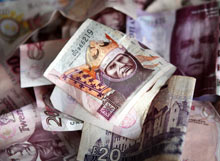 Yes, you can – but it doesn't legally have to be accepted. Three banks in Scotland are authorised to issue notes: Bank of Scotland, Clydesdale Bank and Royal Bank of Scotland. There are also four note-issuing banks in Northern Ireland: Bank of Ireland; AIB Group (which trades as First Trust Bank in Northern Ireland), Northern Bank and Ulster Bank. Banknotes issued by all seven are legal currency and can be accepted throughout the UK. But it doesn't necessarily mean they will be. The Association of Commercial Banknote Issuers (ACBI) states: "The term 'legal tender' has very little practical meaning as far as ordinary, everyday transactions are concerned, and it has no bearing on the acceptability of authorised banknotes as a means of payment …" Crucially, it adds: "The acceptability of any means of payment, including banknotes, is essentially a matter for agreement between the parties involved."
Yes, you can – but it doesn't legally have to be accepted. Three banks in Scotland are authorised to issue notes: Bank of Scotland, Clydesdale Bank and Royal Bank of Scotland. There are also four note-issuing banks in Northern Ireland: Bank of Ireland; AIB Group (which trades as First Trust Bank in Northern Ireland), Northern Bank and Ulster Bank. Banknotes issued by all seven are legal currency and can be accepted throughout the UK. But it doesn't necessarily mean they will be. The Association of Commercial Banknote Issuers (ACBI) states: "The term 'legal tender' has very little practical meaning as far as ordinary, everyday transactions are concerned, and it has no bearing on the acceptability of authorised banknotes as a means of payment …" Crucially, it adds: "The acceptability of any means of payment, including banknotes, is essentially a matter for agreement between the parties involved."
English shopkeepers who are unfamiliar with them may refuse to accept Scottish or Northern Irish notes. This is usually because they cannot tell whether the note is genuine, rather than their feeling towards the Scots.
Trivia fans may like the following: By law, authorised banks are required to hold backing assets for their notes at all times, which can be done in the form of special Bank of England notes – amounts can range up to £1m notes (Giants) and £100m (Titans).
Adobe Photoshop is the photo-editing software, and the latest version, CS6, retails for around £449, which is rather a lot if all you want to do is remove red-eye. Warhammer is a part-hobby, part-gaming fantasy battle where players constantly grouch about the cost of individual dark elves, blood knights and dire wolves.
But it's saffron, made from the stigmas of crocuses, which sparks most concern. A Schwartz jar containing just 0.4g retails for £4.16 in Sainsbury's. A kilo will set you back £10,400.
The reason? It takes around two football pitches of crocuses to glean a kilo, with each stigma collected by hand.
The bad news is that if you started higher education between 1990 and 1997, your student loan will impact on your credit score if you are a late payer or miss a repayment. The Student Loans Company writes to late payers giving them 28 days to make contact or the late/missed payment will show up on their credit record. But the good news is that if you started higher education between 1998 and 2011, your "post-98"-type of loan does not show up on credit reference agencies.
 The answer depends on whether you have other debts, and when you studied. If you started higher education after 1998, you have a "post-98" loan and are paying interest at 1.5% (the Bank of England 0.5%, plus 1%). You only repay this type of loan if you are earning above £15,795, or from April 2013, over £16,365. You can overpay whenever you like. For details, see studentloanrepayment.co.uk.
The answer depends on whether you have other debts, and when you studied. If you started higher education after 1998, you have a "post-98" loan and are paying interest at 1.5% (the Bank of England 0.5%, plus 1%). You only repay this type of loan if you are earning above £15,795, or from April 2013, over £16,365. You can overpay whenever you like. For details, see studentloanrepayment.co.uk.
If you started higher education between 1990 and 1997, you have the old style "mortgage" type student loan and are paying interest at 3.6%. You must make repayments if you earn over £27,813 a year, though you can pay before that. You can make extra payments on top any time and there are no penalties for early repayment.
If you have other debts, the general rule is to pay them off first before paying off your student loan because the majority of other debts will be costing far more. And remember that, unlike other debts, if you don't earn enough, you simply don't need to repay student loans and any outstanding debt is written off after 25-30 years or if you die.
If you still have cash to spare after paying off other debts, and you have a "post-98" loan, you will be better off saving your excess cash than using it to repay your loan. The interest you can earn in a top savings account outstrips the 1.5% cost of student loans, especially if you are a basic rate taxpayer.
The same cannot be said if you are paying 3.6% on a pre-1998 loan. You will not easily outdo the student loan interest rate. Consider using spare cash to pay off your loan. But, think twice if there is any chance at all that you may need to borrow money in the future.
A step-by-step guide to whether it's worth paying off your student loan, including a useful calculator showing you how long it will take to repay it, is at Moneysavingexpert.com.
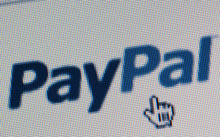 Providing you ignore those "phishing" emails which pretend to come from PayPal (they try to get your personal banking details), it has a good security record. The difficulty is where something goes wrong, possibly with the goods you buy. PayPal is not a credit card so you have no protection under the Consumer Credit Act. It is not regulated, so you can't complain to the Financial Ombudsman Service. And its 45-day complaint period – after which it generally refuses to deal with consumers – has no basis in law other than PayPal's own terms and conditions. This can be very short – especially if dealing with an overseas seller.
Providing you ignore those "phishing" emails which pretend to come from PayPal (they try to get your personal banking details), it has a good security record. The difficulty is where something goes wrong, possibly with the goods you buy. PayPal is not a credit card so you have no protection under the Consumer Credit Act. It is not regulated, so you can't complain to the Financial Ombudsman Service. And its 45-day complaint period – after which it generally refuses to deal with consumers – has no basis in law other than PayPal's own terms and conditions. This can be very short – especially if dealing with an overseas seller.
But, according to the UK Payments Council, rules in place since the start of this year mean that, in Europe at least, it should now be a lot faster. It states: "The day after you send money electronically from a bank within the EU, the money must be received and credited to the recipient account (again, if within the EU). So, for example, if the money leaves my account on a Monday, it must be received and credited by the end of Tuesday."
There are no rules covering payments outside of the UK but your bank should be able to tell you what options there are. The more information you have about where the money is going, the quicker and safer the payment will be. Most banks will offer an option where the money will get to its destination within three to five days. Be aware, though, that not all banks or financial institutions offer the full set of options.
The Australian swimmer was the star of the BBC Olympics commentary team in August. But he also prompted a "huge spike" in internet searches about his sexuality, says Google. Just type "is" into google.co.uk and it automatically tries to complete the sentence as "is Ian Thorpe gay".
The drop-down list in autocomplete is generated by the search engine's complex algorithms, based on other users' search activities and the contents of web pages indexed by Google.
The suggestions often seem strange or just plain silly. Google agrees. It explains: "There may be a search term that seems surprising to you, but after doing some searching on the web, you may discover that it's a popular phrase online for some reason that you didn't anticipate.
"Queries in autocomplete are algorithmically determined based on a number of factors (including search term popularity) without manual intervention."
The suggestions reflect regional activity, so Thorpe tops a search beginning "is" in the UK, but not in the US (where "is shingles contagious" is the top search result).
They also reflect recent activity – so Thorpe is likely to drop out of the list soon. "Is Kate Middleton pregnant" moved up from ninth to seventh most popular this week alone.
Pornography, violence, and hate speech are excluded from autocomplete, but Google has frequently found itself in court over the suggestions autocomplete makes. It lost a case in France last year involving the word "scam" appearing after a particular company's name. Meanwhile, in Japan it is battling a district court's order to suspend autocomplete altogether.
Here we reveal what you most want answered.
Will my credit card work after going through the washing machine?
 Worried about your credit rating? Your spouse's credit record? No, you're not. Start tapping into Google "will my credit..." and it reveals that the second most common dilemma is whether a credit card will survive a wash cycle. (The first, driven by users in the US, is "will my credit card work in Europe.") The trouble is, the answers that appear at the top of the search results can be as daft as the questions. For example, Yahoo! Answers tells you that a credit card that goes through a washing machine will carry on working so long as it's not damaged – but won't, if it is. True, but not especially helpful (and that was rated as "best answer" by Yahoo! readers).
Worried about your credit rating? Your spouse's credit record? No, you're not. Start tapping into Google "will my credit..." and it reveals that the second most common dilemma is whether a credit card will survive a wash cycle. (The first, driven by users in the US, is "will my credit card work in Europe.") The trouble is, the answers that appear at the top of the search results can be as daft as the questions. For example, Yahoo! Answers tells you that a credit card that goes through a washing machine will carry on working so long as it's not damaged – but won't, if it is. True, but not especially helpful (and that was rated as "best answer" by Yahoo! readers).So we put it to Barclaycard, which operates more than 10m credit cards in the UK. It said: "Water won't damage the ability of a chip to function." The bigger problem will be if the plastic warps or even melts.
It seems credit card plastic can start to melt at around 57C, but that should make it safe in any British summer. Perhaps, though, you should be wary about flashing your plastic in Aziziya in Libya. It holds the record for the highest temperature measured, at 57.8C (136F). Mind you, that was in 1922.
As regards credit cards in Europe the Americans have a point; while our credit cards have a chip and the magnetic strip, most Americans are still using cards with a magnetic strips only, which might be rejected at some payment terminals over here. Tell them it's about European technological superiority.
Is my money safe in Santander?
 Before you've completed typing "is my money safe …" up pops "in Santander" as the suggested question. Evidently loads of you are worried that Spain's crisis-hit economy and bombed-out banking sector will affect your savings in Santander, Spain's second biggest bank and our fifth biggest. Indeed, nearly all of the "is my money safe" suggestions are about Spain, although you also ask about Barclays.
Before you've completed typing "is my money safe …" up pops "in Santander" as the suggested question. Evidently loads of you are worried that Spain's crisis-hit economy and bombed-out banking sector will affect your savings in Santander, Spain's second biggest bank and our fifth biggest. Indeed, nearly all of the "is my money safe" suggestions are about Spain, although you also ask about Barclays.The good news is that one of the first results that comes up on Google was written by the team here at Guardian Money. The basic answer is that Santander UK is wholly ringfenced from Santander Spain, and the Spanish parent company can't prop itself up by pinching capital from its UK operation.
Even a collapse in the euro is likely to hurt the other major banks in Britain a lot more than Santander's UK operations. Still, we always recommend that savers do not put more than £85,000 in any UK bank (Santander included). That's the maximum bailout from the Financial Services Compensation Scheme.
Will a bank accept a torn cheque?
Lots of you worry about cheques being refused – maybe because there is a misspelling, or because it is torn or ripped. It all depends on how and where it is ripped. The industry group responsible for cheques, the UK Payments Administration, says: "There are no hard and fast rules, but there is a standard format, and cheque clearing is an automated process, so any cheque which can't be easily processed, can run the risk of a branch saying that they won't accept it and you'll need a replacement. On all cheques there's a code line at the bottom which is "read" by the processing machines, so it's best for that area not to be damaged. Small cuts or tears (which we can all make to cheques as we try to get one out of an envelope) may not be an issue, but one that has been ripped into a few pieces and is held together by Sellotape, is likely to be rejected."Alternatively, your bank may make a small charge for processing a damaged cheque. Since it won't go through the automated process, it can be processed manually. This depends on the service that your bank offers – increasingly, banks require all cheques to go through a one-size-only pipe!"
The standard format means you can no longer write a cheque on an unusual object, as you might have done in the past. According to a Guardian "notes and queries" story in G2, cheques have been written on a cow, a horse, an egg, toilet paper, giant cards, etc. The cow story was actually true (it was a farmer's protest about EU policy) but the bank insisted on keeping the cow as evidence of the payment.
Is it fraud to accept too much change in a shop?
It's not fraud. But it probably is theft. Fraud is "wrongful or criminal deception intended to result in financial or personal gain". Fraud would involve inducing the shopkeeper to part with the money, which is hardly the case with too much change.But knowingly taking too much is theft, defined as the unauthorised taking, keeping or using of another's property. Legally speaking, this does not extend to accepting that extra coin accidentally, for the act of theft has to be accompanied by a "mens rea" – a "guilty mind" – which includes the intent to permanently deprive the owner of the rightful possession of their property or its use. So if you know you have done it, and you know this is wrong (otherwise you would not ask the question) then it is wrong. Irrespective of the law, staff are often forced to make up shortages in the till at the end of the day from their own pockets. Hand it back.
Can I spend Scottish money in England?
 Yes, you can – but it doesn't legally have to be accepted. Three banks in Scotland are authorised to issue notes: Bank of Scotland, Clydesdale Bank and Royal Bank of Scotland. There are also four note-issuing banks in Northern Ireland: Bank of Ireland; AIB Group (which trades as First Trust Bank in Northern Ireland), Northern Bank and Ulster Bank. Banknotes issued by all seven are legal currency and can be accepted throughout the UK. But it doesn't necessarily mean they will be. The Association of Commercial Banknote Issuers (ACBI) states: "The term 'legal tender' has very little practical meaning as far as ordinary, everyday transactions are concerned, and it has no bearing on the acceptability of authorised banknotes as a means of payment …" Crucially, it adds: "The acceptability of any means of payment, including banknotes, is essentially a matter for agreement between the parties involved."
Yes, you can – but it doesn't legally have to be accepted. Three banks in Scotland are authorised to issue notes: Bank of Scotland, Clydesdale Bank and Royal Bank of Scotland. There are also four note-issuing banks in Northern Ireland: Bank of Ireland; AIB Group (which trades as First Trust Bank in Northern Ireland), Northern Bank and Ulster Bank. Banknotes issued by all seven are legal currency and can be accepted throughout the UK. But it doesn't necessarily mean they will be. The Association of Commercial Banknote Issuers (ACBI) states: "The term 'legal tender' has very little practical meaning as far as ordinary, everyday transactions are concerned, and it has no bearing on the acceptability of authorised banknotes as a means of payment …" Crucially, it adds: "The acceptability of any means of payment, including banknotes, is essentially a matter for agreement between the parties involved."English shopkeepers who are unfamiliar with them may refuse to accept Scottish or Northern Irish notes. This is usually because they cannot tell whether the note is genuine, rather than their feeling towards the Scots.
Trivia fans may like the following: By law, authorised banks are required to hold backing assets for their notes at all times, which can be done in the form of special Bank of England notes – amounts can range up to £1m notes (Giants) and £100m (Titans).
Why is saffron so expensive?
Brits are deeply puzzled as to why the luminous yellow-orange spice is so pricey. Type "Why is so expensive" into google.co.uk and top is: "why is saffron so expensive?" After that, it's insurance, Photoshop, champagne and Warhammer that users fret about.Adobe Photoshop is the photo-editing software, and the latest version, CS6, retails for around £449, which is rather a lot if all you want to do is remove red-eye. Warhammer is a part-hobby, part-gaming fantasy battle where players constantly grouch about the cost of individual dark elves, blood knights and dire wolves.
But it's saffron, made from the stigmas of crocuses, which sparks most concern. A Schwartz jar containing just 0.4g retails for £4.16 in Sainsbury's. A kilo will set you back £10,400.
The reason? It takes around two football pitches of crocuses to glean a kilo, with each stigma collected by hand.
Does my student loan affect my credit rating?
Student-loan related questions pepper Google autocomplete: when it will come through, what the interest rate will be, how and when it is paid off, and whether it will affect a mortgage. The credit rating one appears to be one of the most common – and it all depends on when you took out the loan.The bad news is that if you started higher education between 1990 and 1997, your student loan will impact on your credit score if you are a late payer or miss a repayment. The Student Loans Company writes to late payers giving them 28 days to make contact or the late/missed payment will show up on their credit record. But the good news is that if you started higher education between 1998 and 2011, your "post-98"-type of loan does not show up on credit reference agencies.
Should I pay off my student loan?
 The answer depends on whether you have other debts, and when you studied. If you started higher education after 1998, you have a "post-98" loan and are paying interest at 1.5% (the Bank of England 0.5%, plus 1%). You only repay this type of loan if you are earning above £15,795, or from April 2013, over £16,365. You can overpay whenever you like. For details, see studentloanrepayment.co.uk.
The answer depends on whether you have other debts, and when you studied. If you started higher education after 1998, you have a "post-98" loan and are paying interest at 1.5% (the Bank of England 0.5%, plus 1%). You only repay this type of loan if you are earning above £15,795, or from April 2013, over £16,365. You can overpay whenever you like. For details, see studentloanrepayment.co.uk.If you started higher education between 1990 and 1997, you have the old style "mortgage" type student loan and are paying interest at 3.6%. You must make repayments if you earn over £27,813 a year, though you can pay before that. You can make extra payments on top any time and there are no penalties for early repayment.
If you have other debts, the general rule is to pay them off first before paying off your student loan because the majority of other debts will be costing far more. And remember that, unlike other debts, if you don't earn enough, you simply don't need to repay student loans and any outstanding debt is written off after 25-30 years or if you die.
If you still have cash to spare after paying off other debts, and you have a "post-98" loan, you will be better off saving your excess cash than using it to repay your loan. The interest you can earn in a top savings account outstrips the 1.5% cost of student loans, especially if you are a basic rate taxpayer.
The same cannot be said if you are paying 3.6% on a pre-1998 loan. You will not easily outdo the student loan interest rate. Consider using spare cash to pay off your loan. But, think twice if there is any chance at all that you may need to borrow money in the future.
A step-by-step guide to whether it's worth paying off your student loan, including a useful calculator showing you how long it will take to repay it, is at Moneysavingexpert.com.
Is PayPal safe?
 Providing you ignore those "phishing" emails which pretend to come from PayPal (they try to get your personal banking details), it has a good security record. The difficulty is where something goes wrong, possibly with the goods you buy. PayPal is not a credit card so you have no protection under the Consumer Credit Act. It is not regulated, so you can't complain to the Financial Ombudsman Service. And its 45-day complaint period – after which it generally refuses to deal with consumers – has no basis in law other than PayPal's own terms and conditions. This can be very short – especially if dealing with an overseas seller.
Providing you ignore those "phishing" emails which pretend to come from PayPal (they try to get your personal banking details), it has a good security record. The difficulty is where something goes wrong, possibly with the goods you buy. PayPal is not a credit card so you have no protection under the Consumer Credit Act. It is not regulated, so you can't complain to the Financial Ombudsman Service. And its 45-day complaint period – after which it generally refuses to deal with consumers – has no basis in law other than PayPal's own terms and conditions. This can be very short – especially if dealing with an overseas seller.How long will it take to transfer money overseas?
This really bothers bank customers – both the time it takes and the cost. In the past it could take as long as two weeks, and came with hefty fees.But, according to the UK Payments Council, rules in place since the start of this year mean that, in Europe at least, it should now be a lot faster. It states: "The day after you send money electronically from a bank within the EU, the money must be received and credited to the recipient account (again, if within the EU). So, for example, if the money leaves my account on a Monday, it must be received and credited by the end of Tuesday."
There are no rules covering payments outside of the UK but your bank should be able to tell you what options there are. The more information you have about where the money is going, the quicker and safer the payment will be. Most banks will offer an option where the money will get to its destination within three to five days. Be aware, though, that not all banks or financial institutions offer the full set of options.
Anda baru saja membaca artikel yang berkategori Money
dengan judul The most-asked money questions on Google. Anda bisa bookmark halaman ini dengan URL http://portalsolo.blogspot.com/2012/09/the-most-asked-money-questions-on-google.html. Terima kasih!
Ditulis oleh:
Unknown - Saturday, September 8, 2012
Belum ada komentar untuk "The most-asked money questions on Google"
Post a Comment